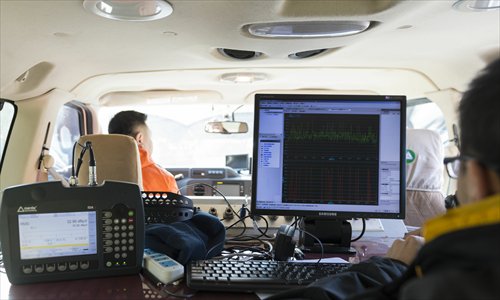HOME >> CHINA
Pirate radio stations that sell erection drugs put air traffic in danger
By Ding Xuezhen Source:Global Times Published: 2016/6/16 20:38:00

Police officers from Changchun, Northeast China's Jilin Province detect signals from illegal radio station in February 2016. Photo: CFP
Unlicensed radio stations broadcasting racy commercials for sex-related medicines have been rampant in recent years in China, regardless of intensified legislative efforts and law enforcement, to stamp out such illegal operations.China adopted harsher punishments for disrupting radio communications during the ninth amendment of its Criminal Law in 2015. According to the amendment, people operating unlicensed radio stations or using radio frequencies without a permit may face up to seven years in prison.
However, China's airwaves are still being regularly hijacked by pirate stations.
"In 2015, a total of 225 illegal radio stations were busted [in Shenyang]. And in 2016, we have already shut down another 66," Liu Weidong, head of Shenyang's radio authorities, Northeast China's Liaoning Province, told the Xinhua News Agency.
"This year [the government] will make intensified efforts to crack down illegal radio stations, according to relevant documents," said Zhu Dailong, head of the radio regulation office in Hefei, East China's Anhui Province, the Hefei-based Xin'an Evening News reported in February.
Safety risks
"Sometimes when I was driving and listening to the radio, it seemed to 'automatically' change to another channel broadcasting commercials for sex-related drugs," Zhu Wei, deputy director of the Communications Law Research Center at the China University of Political Science and Law, told the Global Times.
Many illegal radio stations broadcast on the same frequencies used by licensed broadcasters, Tang Xiaoqiang, a Beijing policeman, told a newspaper affiliated with the State Administration of Press, Publication, Radio, Film, and Television in May.
In this way, those unlicensed radio stations could "insert illegal medical advertisements" and mislead listeners into believing that these adverts are legal and therefore trustworthy, Tang explained, citing as an example a fake radio station discovered in Beijing which used the frequency of the Tianjin People's Broadcasting Station's entertainment channel.
Such illegal radio stations, equipped with high-power transmitters can usually reach radios within a 15- to 20-kilometer radius, Tang said, adding that they once busted a station which could send signals up to 50km away.
The illegal radio stations could not only encroach on consumer's rights by broadcasting "false and vulgar" ads but can also lead to potential safety concerns, Zhu said.
About 80 percent of the illegal radio stations busted in Shenyang broadcasted commercials for sex-related drugs including those used to treat erectile dysfunction, Xinhua reported. Most of the drugs sold via such radio stations are either made by unlicensed manufacturers or are counterfeit, insiders from the pharmaceuticals industry were quoted by The Beijing News as saying in January.
Previous reports said that such broadcasters can also affect the safety of airplanes. In January 2015, four planes had their landings at an airport in Liaoning Province disrupted by an illegal radio station, as whose signals interfered with communications between pilots and air traffic controllers.
Pirate stations might be used to spread content that risks national security, Zhu noted.
Radio restrictions
Currently, pirate radio stations can usually operate without anyone physically present as it is possible for operators to simply program the machines and then leave them to broadcast alone, analysts said. This makes it difficult to catch pirates and contributes - along with the profits on offer - to the recurrence of such illegal activities.
In the past, rooms in high-rise buildings were rented to conceal such illegal radio stations, while criminals now just leave the equipment on rooftops, an official from the radio regulatory authorities told the Global Times on condition of anonymity.
In December 2015, two people were nabbed by local police for operating five illegal radio stations in Wuhan, Central China's Hubei Province which they used to broadcast racy commercials for anti-impotence drugs. Buying the drugs at 1,000 yuan ($151) a box and selling them for nearly 10,000 yuan, the two had made a profit of more than 200,000 yuan in less than half a year, according to police, Wuhan-based the Changjiang Times reported.
Most devices used in illegal radio stations were manufactured without the required permit and transmitters can be easily purchased online, according to the unnamed radio official.
Newspaper headline: Hijacking the airwaves
Posted in: Society